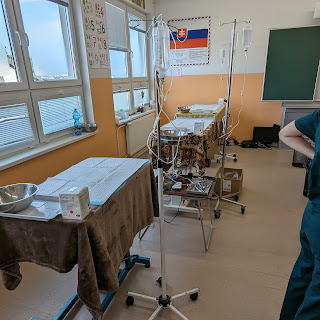Frequently Asked Questions
1. Why did you choose Slovakia?
In a nutshell, someone I worked with (who is a very good vet), went here, and said that I might find it a good fit. I went home, sent an email asking to apply, and heard back pretty quickly. I did so some research into other English-speaking universities in Europe, but the combination of a shorter course and relatively cheap fees (not really cheap, €9000), made Slovakia a winner!
My offer was conditional - because my degree before did not cover biophysics or biochemistry, I had to do those two courses. Biophysics was only for one semester, but biochemistry was for two. It was potentially slightly easier for me because I had those courses online, but they're not as bad as everyone says they are!
2. You're a 5th year but you've only been at vet school for 2 years, how does that work?!
The course I'm on is a post-Bachelor's accelerated course, meaning it's 4 years instead of 6. I started in "third year", which is essentially the first 2 years condensed into one. I did a Bachelor's in Biology at the University of Chester before I came here.
The timetable is very busy, with days often starting at 7:15 and ending at 18:10! It's worth it though for getting the course done sooner, even if it is a lot of work.
Because of how the course is structured, my 'first year' is actually 'third year', and so on, that's how I will refer to things on the blog.
3. How hard is it living in Slovakia, and not speaking Slovak?
It's not too difficult - a lot of people do speak english, and the google translate app is very useful!
It is possible to do a Slovak course with the university (I couldn't because of the biophysics and biochemistry course), but I have self-taught myself a little. I can understand a bit, and read some, but speaking it is a whole other thing! I do try in some situations (like going to a café/restaurant), but most of the time they hear how I speak and switch to english anyway!
I try not to be that british tourist that expects everyone to work around me, but it's difficult to find the time - I also find that we're not very integrated with the Slovak students at all, so I don't even have someone to practice with!
4. What are classes like at UVMP?
I can't speak much for third year, as this was mostly online for me! I think it's supposed to be primarily lab based for the first year, with animal handling practicals starting in fourth year.
Due to COVID, I was online for the first half of fourth year, but when we came back we did a lot of lab work (especially for parasitology - you are going to be so good at fecal flotation!), and then quite a bit of animal handling in propedeutics.
More and more people are going to UVMP, which is fantastic, but the class sizes are getting quite large for what was typically quite a small school! In my first 3 years, our groups have been between 12 and 16 people, which doesn't sound like a lot, but many of the rooms are quite small, and we may only have one or two animals to practice our skills on. In my last year, the BSc, JSP and GVM classes will combine for our State groups, so the classes will be larger still, but we don't have practical classes then, only clinical hours.
For a class like surgery, 2 groups may be scheduled at the same time, so we have 4 cadavers, meaning 8 people for each animal, to learn about surgery. For other, lab-based classes, we often work in groups of 2 or 3.
There's not really a lot of 'homework' per se, but some classes will set assignments, like writing lab reports, writing clinical reports on animals, there's been a few classes we have to do presentations in (normally in groups), or write an essay.
There are credit tests, and it's up to the teachers how those are set out. Most of the time they're just short written tests, MCQ or SAQ. I've heard in Anatomy though, one of the teachers likes to do credit tests each week to test you on what you learnt last week! In my first semester of pharmacology, we had short credit tests each week, where we'd have to know the active substance for a specific medication, calculate a dose, and write a prescription. I personally preferred this, as it made sure I kept on top of everything.

.jpg)

Comments
Post a Comment